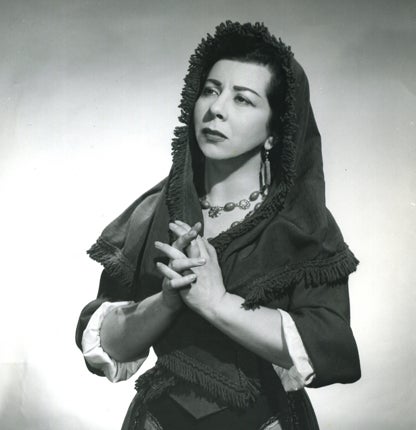Giulietta Simionato: Italian mezzo-soprano with a remarkably wide repertoire

The death of the Italian mezzo Giulietta Simionato, a week short of her 100th birthday, marks the end of a period in operatic history – and of a generation of singers who made their debuts before the Second World War and reached their peak in the years after it.
Simionato sang for 30 years at La Scala, Milan, first in small parts, then from 1947 onwards in major roles in the operas of Rossini, Bellini, Donizetti, Verdi and many other composers from Mozart and Gluck to Berlioz and Bizet. Her superb coloratura technique appeared effortless, while she was equally gifted in comedy and tragedy. Immensely popular in Italy, she also sang all over Europe and in North and South America, though La Scala was the home to which she always returned.
Simionato was born in Forli in 1910. She studied with Ettore Locatello in Rovigo and Guido Palumbo in Padua, making her debut while still a student as Lola in Mascagni's Cavalleria Rusticana at Montagnana in 1928. After winning a singing competition in 1933 in Florence, she was given a small role in the premiere of Pizzetti's Orsèolo in that city in 1935. She made her Scala debut the following year as Maddalena in Verdi's Rigoletto. For the next six or seven years she sang small roles, such as Beppe in Mascagni's L'Amico Fritz and Canzade in Casella's La Donna Serpente. In 1944 she graduated to Meg in Verdi's Falstaff and Cherubino in Mozart's Le Nozze di Figaro, which she also sang with the Glyndebourne company at the 1947 Edinburgh Festival. When La Scala re-opened after the war that year, she became a leading singer with a very varied repertory.
After Dorabella in Mozart's Cosi Fan Tutte and the title role of Thomas's Mignon, she sang Rosina in Rossini's Il Barbiere di Siviglia, which became one of her favourite roles. Simionato next took on the Princess de Bouillon in Cilea's Adriana Lecouvreur, Leonore in Donizetti's La Favorite, Charlotte in Massenet's Werther and Preziosilla in Verdi's La Forza del Destino. In 1950 she scored a personal triumph as Marfa in Mussorgsky's Khovanshchina, a tragic role in great contrast to her next new role at La Scala, Isabella in Rossini's Italiana in Algeri, a hilarious comedy. The title role of Rossini's La Cenerentola in 1953 offered opportunities for tears and laughter, as did Bizet's Carmen.
In 1953 Simionato made her Covent Garden debut as Adalgisa in Bellini's Norma, with Maria Callas in the title role. Their duets together brought the entire theatre to its feet, cheering and applauding for minutes on end. The mezzo then sang Charlotte and Rosina in San Francisco, before going to Chicago in 1954 for the opening of the Lyric Opera with Norma. Callas again sang the title role and the same scenes of cheering and applause as in London were repeated. Simionato also sang Rosina and Carmen in Chicago. In 1956 she made her debut in Vienna with the Scala company as Fidalma in Cimarosa's Il Matrimonio Segreto and, back in Milan, she made a notable Delilah in Saint-Saëns' Samson et Dalila.
Simionato appeared with Callas at La Scala in 1957, as Giovanna Seymour to the soprano's Anna Bolena in Donizetti's opera of that name. Once more the reception was overwhelming. The mezzo also gained several new Verdi roles, Ulrica in Un Ballo in Maschera at La Scala, Mistress Quickly in Falstaff and Eboli in Don Carlos at the Salzburg Festival and Azucena in Il Trovatore at La Scala in 1959. Azucene was probably the finest of all her Verdi characterisations and it was her debut role at the Metropolitan Opera, New York in 1959. She also sang Rosina, Amneris and Santuzza at the Met. At La Scala her later roles included Sinaide in Rossini's Mosè, Dido in Les Troyens, Gluck's Orpheus and Valentine in Meyerbeer's Les Huguenots, in which Joan Sutherland sang Marguerite de Valois. This was not a great success, though the singers were praised, but in 1962 Rossini's Semiramide, with Sutherland in the title role and Simionato as Arsace, was much appreciated.
Simionato returned to Covent Garden in 1963 as Amneris; the following season she gave some wonderful performances of Azucena. In 1966 she made her farewell at La Piccola Scala as Servilia in Mozart's La Clemenza di Tito, then, recently married to Dr Cesare Frugoni, an 85-year-old surgeon, she retired from the opera stage.
Giulietta Simionato, opera singer: born Forli 12 May 1910; married Dr Cesare Frugoni (deceased); died Rome 5 May 2010.
Join our commenting forum
Join thought-provoking conversations, follow other Independent readers and see their replies
Comments